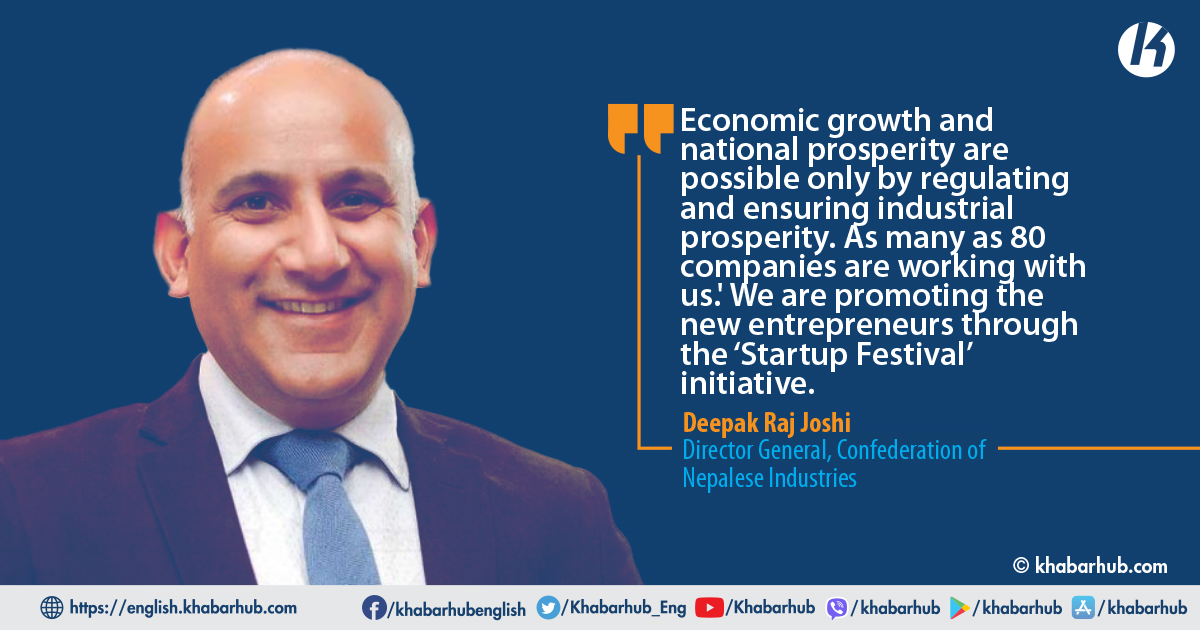KATHMANDU: Confederation of Nepalese Industries (CNI) has launched a new program for young businessmen of late. CNI initiated the ‘Start of Festival’ aims to encourage young businessmen and investors.
This program has been successfully implemented in some places. Along with this, the Confederation has also promoted the catchy slogan that youths should take the lead in the country’s prosperity by engaging young businessmen in entrepreneurship.
Deepak Raj Joshi, Director General of the Confederation, is taking part in such programs with the slogan that prosperity of the country is possible only after establishing the youth in business.
Excerpt of the interview Khabarhub’s Subhas Pradhan had with former Chief Executive Officer of Nepal Tourism Board (NTB) and incumbent CNI Director General Joshi:
What are the objectives and plans to take Nepali products to the world market for which you became the Director General of the Confederation?
Previously, Nepal had 12 percent of products. But now it has gone down to 5 percent. Our economy lost its independence and has become more dependent lately.
This is not good for sustainable development because if industries are not developed in the country, employment opportunities will be less.
Moreover, the country’s economy will go into deficit. There can be no sustainable development when it comes to the economy. Therefore, now we are running ‘Nepal Swadeshi Abhiyan’ in collaboration with Nepal Government.
We have launched this campaign after seeing the alarming situation in the country. The main objective of this campaign is to produce goods in Nepal and sell them abroad so that the economy of Nepal will be satisfactory.
The prosperity of the country is possible only by selling the goods produced by Nepal.
Many industrialists complain that the support that should have been received from the government has not been received. Have you received any support from the government?
Nepali producers should unite and join us in our campaign. First of all, our products should be of good quality. That’s why we have put a logo that is good.
Consumers are always looking for better and stronger products. We should be able to do that. We have supported such industries which need any support from government agencies or if another support is needed.
Skilled human resources are needed for quality goods. For that, we have done things that play a coordinating role in enhancing the skills and efficiency of the workers. When exporting goods abroad, we do marketing based on our interests and our future prospects.
What is your responsibility when you say that there should be some discount on the raw materials required for production?
CNI is an umbrella organization of private sector industrialists. We discuss with policymakers in government agencies.
And we have also worked with entrepreneurs and producers. We have worked as a supporter of the private sector. We are here to help everyone.
What is the young generation’s response to your campaign?
Generally, people’s attention goes to foreign goods rather than Nepali goods. There is a thought that Nepalese goods do not meet the standards, but that is not true.
Today’s industrialists have taken many risks for good products. They have ensured quality, whether it is in the garment, in the factory, or everywhere. Our cement is a very high-quality product.
The new generation is now more attracted to some local/national products. ‘Made in Nepal’ shoes and clothes have become youths’ choice now.
How did you come up with the idea that Nepali products should be taken to the world market?
We were concerned about the condition of Nepali industries. Economic growth and national prosperity are possible only by regulating and ensuring industrial prosperity.
There are 80 companies working with us. We are promoting new entrepreneurs through the ‘Startup Festival’ initiative. It has become very effective now. There are also some new plans.
The program has shown that provided a conducive atmosphere for the industrial sector is ensured, there are many investors willing to contribute to this sector.
We have connected 7 to 8 steps. One should be trained on how to come back into the sector even if the investment worth 15 million to 80 million goes bankrupt.
The newcomers do not have value jobs as before. There is a great scope in the industrial sector. Digital platforms can be used to collaborate in the world’s largest markets.
Now, what kind of process should the youth adopt to get support from organizations including yours?
We have a process for that. One is the ‘Startup Festival’ which we started this year. We will launch it every year. When it’s open, we invite applications.
There will be many proposals. We will support the good ones. We will connect with investors. If there is a better plan, we will build our network of investors.
Many people invest first, then, see the danger of bankruptcy or there is no benefit or the business does not work, and they feel about quitting. What should be done to avoid that risk?
We saw the practice of giving donations in many sectors. That is not much good. If investors invest rather than tempt with grants, the plan will be successful. Grants alone cannot ensure profit.
There has been an increase in the tendency to take subsidies easily and abuse them, how can it be monitored?
A subsidy is not required for large investments. New ideas require little investment and more monitoring.
How are you training young businessmen technically?
Now we have cooperated with investors from developed countries. There has been cooperation with big construction businesses and industries.
We are working to connect the youth to those industries and re-connect them by training the new ones.
A program to cooperate with the government of Nepal has started. We also have a plan to connect the youth in the tourism sector and create more opportunities.









Comment